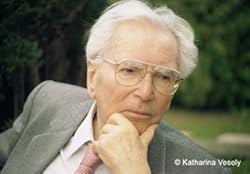Man's Search for Meaning
by Viktor E. Frankl
by Viktor E. Frankl
- Nonfiction, Holocaust, Psychology
- 14+ for complex ideas and theories
- Published 1945
- ★★★★★
"Psychiatrist Viktor Frankl's memoir has riveted generations of readers with its descriptions of life in Nazi death camps and its lessons for spiritual survival. Between 1942 and 1945 Frankl labored in four different camps, including Auschwitz, while his parents, brother, and pregnant wife perished. Based on his own experience and the experiences of others he treated later in his practice, Frankl argues that we cannot avoid suffering but we can choose how to cope with it, find meaning in it, and move forward with renewed purpose. Frankl's theory-known as logotherapy, from the Greek word logos ("meaning")-holds that our primary drive in life is not pleasure, as Freud maintained, but the discovery and pursuit of what we personally find meaningful.
At the time of Frankl's death in 1997, Man's Search for Meaning had sold more than 10 million copies in twenty-four languages. A 1991 reader survey for the Library of Congress that asked readers to name a "book that made a difference in your life" found Man's Search for Meaning among the ten most influential books in America." - Goodreads
Review
 Now this was a summer reading book, and I hate being required to read books. It's one of my biggest struggles with school as well as reading, if I'm told to read a book I typically end up not liking the book. When I chose Man's Search for Meaning from my list of options, I thought I would like it. I don't want to say I typically enjoy Holocaust books, because enjoy is a very bad adjective for how I feel about the topic. However, I am fascinated by the topic and normally have good opinions about books on the topic (at least accurate ones, so not Boy in the Striped Pajamas). I think this was my first mistake, going into the book assuming I'd like it, as this gave me high expectations that are almost impossible to meet. There was also the classic instance of my inability to focus, which allows me to get distracted by anything and everything and avoid reading. (If you have this problem I recommend trying out Soundrown, it really helps.)
Now this was a summer reading book, and I hate being required to read books. It's one of my biggest struggles with school as well as reading, if I'm told to read a book I typically end up not liking the book. When I chose Man's Search for Meaning from my list of options, I thought I would like it. I don't want to say I typically enjoy Holocaust books, because enjoy is a very bad adjective for how I feel about the topic. However, I am fascinated by the topic and normally have good opinions about books on the topic (at least accurate ones, so not Boy in the Striped Pajamas). I think this was my first mistake, going into the book assuming I'd like it, as this gave me high expectations that are almost impossible to meet. There was also the classic instance of my inability to focus, which allows me to get distracted by anything and everything and avoid reading. (If you have this problem I recommend trying out Soundrown, it really helps.)
This is my second two star rating in a row, and I think that the fact that both were required reads plays a big role in that. Also, I'm not such a fan of nonfiction and very few nonfiction books have ever caught my attention. Overall, this book really didn't stand a chance fro the beginning with me. However, if you're a fan of psychology, this book may prove to be interesting. The same applies to fans of nonfiction and autobiographies, as the book details the author's experience in the concentration camp. If you're expecting a book similar to other Holocaust books, don't because this novel has a unique take on the situation rarely seen in literature. Frankl not only details the impact on prisoners, but also the inner workings of a concentration camp, mainly the smaller ones rather than the well known ones such as Aushwitz. The novel may provide insight for people wondering how the prisoners were affected by their devastating circumstances, and if this is you, I strongly recommend reading Man's Search for Meaning.
About The Author
"Viktor E. Frankl was professor of neurology and psychiatry at the University of Vienna Medical School until his death in 1997. He was the founder of what has come to be called the Third Viennese School of Psychotherapy (after Freud's psychoanalysis and Adler's individual psychology)—the school of logotherapy.
Born in 1905, Dr. Frankl received the degrees of Doctor of Medicine and Doctor of Philosophy from the University of Vienna. During World War II he spent three years at Auschwitz, Dachau and other concentration camps.
Dr. Frankl first published in 1924 in the International Journal of Psychoanalysis and has since published twenty-six books, which have been translated into nineteen languages, including Japanese and Chinese. He was a visiting professor at Harvard, Duquesne, and Southern Methodist Universities. Honorary Degrees have been conferred upon him by Loyola University in Chicago, Edgecliff College, Rockford College, and Mount Mary College, as well as by universities in Brazil and Venezuela. He was a guest lecturer at universities throughout the world and made fifty-one lecture tours throughout the United States alone. He was President of the Austrian Medical Society of Psychotherapy." - Amazon
Purchase The Book



No comments:
Post a Comment